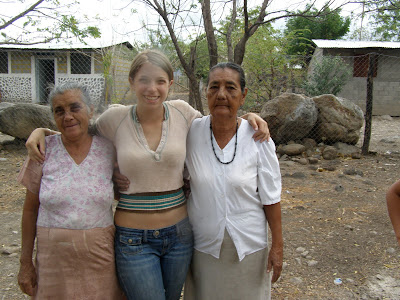Here are my co-delegates on the 2008 delegation (minus one, Paia, who we met up with a few days into the trip)
I wrote extensively on that trip, chronicling what we did, what I learned, my ideas for the future and anything I wanted to make sure to remember. Going back through the many pages I scribbled has been extremely helpful, and alternately depressing and entertaining. Here are some notes I pulled out:
First, some very specific vocabulary that came in handy on the trip. Nicaraguan Spanish, besides having a different accent and pronunciation, also has different vocabulary.
- socio= co-op or union member
- cascada= waterfall
- varon= man
- hembra= woman
- atrasado= backward, like a region without industry
- ordeñar= to milk (a cow)
- maní= peanut
- cosechar= to harvest
- chiwín= child
- tortillar= to make tortillas
- hortaliza= vegetables
- pulpería= general store
- El Señor= Jesus Christ
At meals, the men are served first. But we as guests are served even before them. Men also interrupt/speak for their wives. It's uncomfortable sometimes!
People are very proud of their hospitality. One woman said: "Así somos. Recibimos a cada persona que está lejos de su casa." ("That's how we are. We receive anyone who is far from home.")
People will ask you for your phone number. It's good to give it at least as a gesture of connection. They will call you maybe once, if at all.
"Visits" are formal and important. You're expected to dress up a little even to visit a neighbor.
Then there were anecdotes in my diary that, while probably not practically useful for this trip, made me laugh and remember some of the best moments of that trip.
One favorite was when I asked my host mother, Doña Juana, if the people in the village thought it was important that I was there. I was anxious about my usefulness and my place in their society, and felt like a burden. "Of course!" she replied. "Everyone thinks it's very important that you're here." She paused. "Except the neo-liberals. They don't care about anything."
Here I am with Juana and her sister Reina. I promise Juana smiled a lot, despite the difficult life she's lead, but never in a photograph.
Basically, as wonderful as the last trip was, I've resolved to use what I learned then to make this year's delegation even better.


No comments:
Post a Comment